Regard Extrême
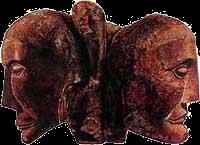
In my point of view Regard Extrême should need no introduction,
as I think that anyone interested in independent music should know that
band, but unfortunately if the curiosity killed the cat, it didn't kill
all music lovers. But as soon as the fatal beauty of that music comes into
your ears, you can't wait listening to some more. Regard Extrême
is a French band which is unique in its country, and in the rest of the
world I must say. The outstanding quality of this musical project put it
amongst the most promising artists of the independent scene. Fabien Nicault,
the founder member of Regard Extrême, explains his music, his cultural
and social visions, in order to help us discovering who's hidding behind
these silent masks. It's time now that we give Regard Extrême the
real attention the band deserves.
Nunc est bibendum !
-
Could you present Regard Extrême, its origins, its beginnings;
its history…
Regard Extrême is in fact a personal project. The practice of piano
from a very young age naturally led me to appreciate classical music. Then
other styles of music and the discovery of parallel movements excited my
curiosity. I was lucky to live in a town where an alternative radio, mainly
turned towards the Underground, prospered. Music enthusiasts used to meet
there to communicate their enthusiasm. Eventually, I ended up hosting a
programme there for about ten years.
-
Which reasons or inspirations led you choose this name?
Fifteen years ago I discovered a French group called "Brigade Internationale".
Unfortunately, this band has only a few productions to its credit. In particular
a live tape that I own. It had an incredible power. A harrowing voice backed
by a bass and a trumpet. I have never heard anything like it since. The
live tape was titled "Regard Extrême". In memory of this short-lived
but intense formation, I took this name which reflects exactly the spirit
of the group.
-
Regard Extrême has been in existence for seven years now, yet
it has not received, in my opinion, the attention it deserves. How do you
explain this?
In the beginning, my first compositions were not really destined to be
released. They were in fact roughs, outlines composed according to my inspirations
and desires. I did not really have any of the constraints imposed by the
necessity to finish a composition.
My first participations to compilations came after two years. Then
the first very confidential composition called "Aux morts". Then I composed
"Résurgence" which should have been produced by a Swiss label. Unfortunately,
things turned out badly. The CD was released a year late and in addition
I was swindled… Following this unhappy experience, I collaborated with
LJDLP on "Die Weiße Rose". The success of this project enabled
me to collaborate with World Serpent for "Vague à l’âme".
This is how the years go by without one realising it…
For me the interest is not in being well known. My sole desire is to
compose according to my rhythm, drawing a maximum of pleasure out of it
whilst hoping that those who listen to this music feel as much pleasure
as I did when composing it.
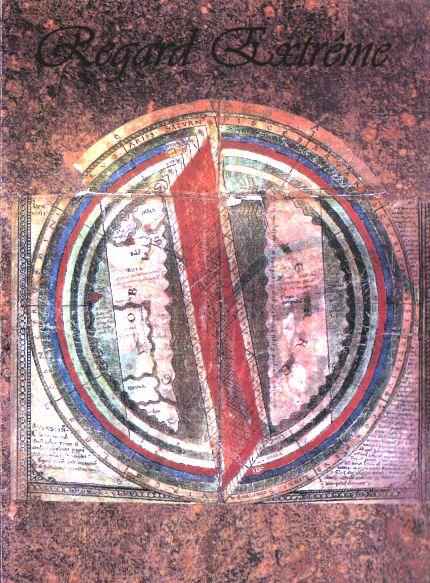 Aux
Morts
Aux
Morts
-
You last album "Vague à l’âme" (1998) is distributed by
World Serpent. Have you gained any concrete advantages from this? Is it
an experience that will be pursued?
The notoriety of this label has allowed me to be accessible to a larger
audience. This album seems to be appreciated by those inclined to pay attention
to it. Many contacts have been established and they have enabled me to
measure the enthusiasm of some.
Concerning my collaboration with WS, it is quite probable that I will
continue this experience.
-
The album "Die Weiße Rose" (1997) is the result of the collaboration
between Regard Extrême and Les Joyaux De La Princesse. Why did your
choice focus on this resistance movement? Concretely, how did you work
together?
In fact, LJDLP proposed this subject to me in view of a collaboration.
On my behalf, more than the story itself, it is the theme that interested
me: the struggle of a minority against the oppressor. This tragedy has
unfortunately been lived many times since the beginning of time. Therefore,
I wanted to express those sufferings through music.
Some tracks were composed separately, the others together. The final
choice, a sort of final cut, was done together.
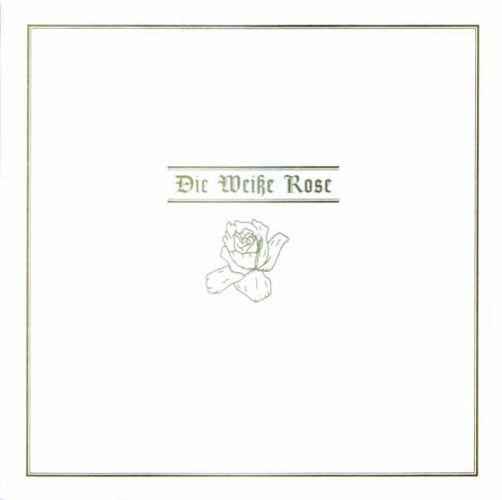
-
Do you share Eric’s fascination for the thirties?
I do not have a particular attraction for this period. Many periods of
History interest me. For each one of them, above all, it is the culture,
the beliefs and lifestyles of those who lived them that interest me.
-
Have you planned to work together again?
At the moment, we have no common project, but it is not excluded.
-
Apart from you owning a home studio, we know very little of your way
of composing. Can you tell us more?
It is very instinctive. Amongst my improvisations, some melodies or atmospheres
set off a trigger inside me that drives me to explore them further. Then
a methodical research work begins. Research on the sonorities, the melodies,
the rhythms. Sometimes the track results in something, sometimes not. In
the end, when a coherent sequence of tracks is constituted, the result
is a new record. This coherence can be articulated around an emotion, a
sentiment, a theme, an imaginary story…
-
Regard Extrême’s instrumental music plunges the listener into
a romantic and melancholic atmosphere. This is especially true for the
album "Vague à l’âme" and the sensitivity of it’s compositions.
Have you ever thought of adding a voice, a text?
Indeed, the album title speaks for itself. On this album, as for the previous
one, it is the main impression that stands out. It is true that that I
have a fondness for music having this propensity. Be it my music or that
of others. This does not mean that I am like this in my everyday life.
Voices are present on some tracks with the use of choirs. It is under
this aspect that I appreciate them the most. However, I would have liked
to use a counter tenor voice, which I appreciate above all. Unfortunately,
I do not have the means to collaborate with a singer who could satisfy
these requirements.
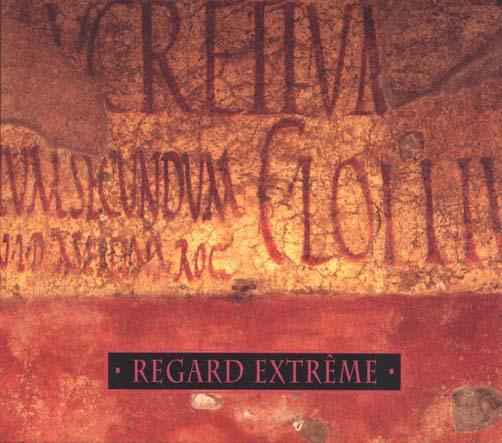 Vague
à l'Âme
Vague
à l'Âme
-
The expression "romantic ritual" is often used to qualify Regard Extrême’s
music. What do you think?
It is not always easy to briefly resume a music’s style. And I should know
with my radio experience. It is one of the terms that can give an idea
of how my music sounds. It is however quite reducing when I think of the
multitude of styles that have influenced me.
-
Which musical purposes and more generally artistic do you pursue with
Regard Extrême?
My purpose is modest. To live and give life to sensations, to arouse the
imagination, to make others feel various emotions… In one word, to share
intense moments through music. Of course, mixing various artforms seems
interesting to me. I pay a particular attention to the presentation of
my various productions. My interest in calligraphy, certain colours, stone,…
results in an aestheticism that marks my graphic presentations. Video could
also be the accomplice of my music…
-
All the titles figuring on your albums are in French. What are the reasons
behind this choice and is it a definite one?
I express myself naturally in French. I also find this language rich and
of beautiful sonority. Therefore, from the start I am inclined to name
my titles in French. I particularly appreciate Japanese and Slav languages
which I do not exclude using if the theme requires them.
-
Who is responsible for the superb design that illustrates all your albums?
It is me, with the help of a graphic artist.
-
Who is responsible for the superb layout and realisation of the web
page www.multimania.com/esparto/java.html ?
A close relation who can be contacted on the site under the pseudonym Esparto.
This realisation is indeed of great quality. I hope that in a near future,
the entire Site will be of the same quality.
-
Do you think that the Internet and its communication facilities have
allowed or will allow some underground bands to reach a larger audience
and consequently obtain more recognition?
Internet allows a more direct contact with the artists. One can find rare
masterpieces impossible to find via traditional networks. Furthermore,
information can be sent in a few seconds to hundreds of people. A real
network can be set-up. In this point of view, it is a good promotional
tool.
On the other hand, the overabundance of information hinders the research
of new things. It is long and tedious. However, perseverance can pay off.
Another problem comes from the fact that many sites are not that reliable.
Sites not updated regularly or abandoned. Some only have ephemeral existences.
In these conditions, it is hard to find one’s path. It is best in that
case to know from the start what one is looking for.
On my behalf, my contacts are more and more numerous since I have set
up the Regard Extrême site. Furthermore, my mailing-list allows me
to rapidly circulate information on Regard Extrême to all those inscribed.
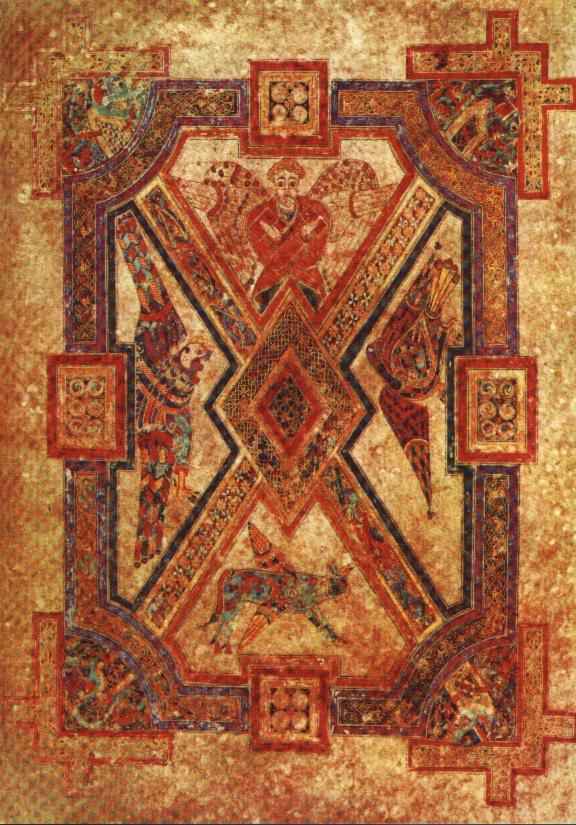 Résurgence
Résurgence
-
You mentioned in a previous interview (Crepusculi Aurora) the
possibility of accompanying your music with semi-virtual videos. Have you
been able to finalise this project or do you intend to concentrate on it
soon?
As I have said before, it is one of my desires. Unfortunately, it is not
possible at the moment. However, I do not despair...
-
What can one expect from a Regard Extrême performance? Are you
accompanied by other musicians on stage?
My experience is pretty thin in this domain. My only appearances were in
the company of LJDLP. It demands a lot of energy and the result is sometimes
disappointing.
What should one expect? I think of a rather minimalist show associating
the aesthetics close to my heart with the power inherent to a live performance.
-
Will we have a chance, one day, of seeing a Regard Extrême performance
in France?
Unfortunately, it seems that in France there are very few concert promoters
interested in this musical genre. Maybe because it does not attract enough
people… However, I am optimistic for next spring, during a festival organised
in Paris.
-
What is your cultural, political and global vision of modern-day Europe?
What do you think of the unification of Europe and are you confident in
its future?
On our continent, many confrontations have succeeded each other over the
centuries. Apart from a few persisting conflicts that it is necessary to
put an end to, the nations in their current configurations are reconciled
with each other. Their closeness and the ensuing exchanges at all levels
allow one to speak of Europe not only as a geographical continent. The
wealth of this community stems from the diversity of cultures and ways
of life. Concerning its future, it is much harder to predict what will
become of it…
At the moment, I am more preoccupied by the fate of those who are still
exposed to violence and repression throughout the world.
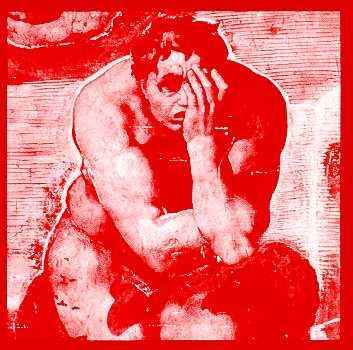
-
Is your work within Regard Extrême the expression of an attachment
to a certain European culture?
If one has to talk of a European Culture, I would say that it is the sum
of a great number of cultures. Because of my formation, my initiatic experiences,
I am extremely sensible to the different styles of artistic expression
that have existed in Europe. That said, many other styles originating from
various countries have influenced me and will continue to do so. I am always
eager to discover…
Yes, in a certain sense I feel an attachment to this culture, but unconsciously,
by the force of circumstances.
-
What are Regard Extrême’s projects for the forthcoming months?
A lot of work. The preparation of a new edition of "Résurgence".
The titles have been completely rearranged and reorchestrated and I hope
to release another CD before the end of the year.
-
Are there any authors or works of art that you consider important and
which, in a certain way, can have influenced the music of Regard Extrême?
A great number of artists and works of art are important for me and influence
my music. The classic composers of course with a particular affection for
Baroque and Medieval music. Amongst our contemporaries the one who, beyond
doubt, was a revelation to me and who remains in my opinion the major reference
is Michael Nyman in the way he uses and marries instruments, rhythms and
harmonies. At last, amongst all the groups I am fond of, Minimal Compact
and Neon Judgement are the most important.
-
To conclude, the usual Heimdallr question: what albums are you listening
to at the moment?
At present, my "bed-side records" are the French lyric tragedies "David
et Jonathas" and "Acteon" from M.A. Charpentier. "Concionero de Medinaceli"
from the medieval composer Pedro Guerrero. "L’orient est rouge" from Okani
orchestar, a tsigan band based on brass instruments and percussions.
-
The last words are yours…
Thank you for the interest you show to my music.
R.E.
Interview: Nathalie F. (September 2000)
Translation: Ian C.

Contact and information :
e-mail: fabien.nicault@libertysurf.fr
site internet: www.multimania.com/esparto/java.html
and : http://RegardExtreme.go.to
Discography :
1993 – "Freak show" K7 compilation (OPN)
1994 – "Best of" K7 compilation (Demothèque)
1994 – "Isis" K7 compilation (Les ateliers du son)
1994 – "Autoplasie II" K7 compilation (Nuit et brouillard)
1994 – "Appel de la muse IV" CD compilation (Alea Jacta Est)
1994 – "Aux morts" K7 C45 (Perspectives)
1995 – "L’ordre et le chaos" CD compilation (Actus Dei)
1995 – "Heilige tod" CD compilation (Palace of worms)
1996 – "Onore alle arti" CD compilation (My castle)
1996 – "Résurgence" CD (Allegoria)
1997 – "Die Weiße Rose" CD (World Serpent)
1998 – "Vague à l’âme" CD (World Serpent)
2000 – "MM" CD compilation (World Serpent)
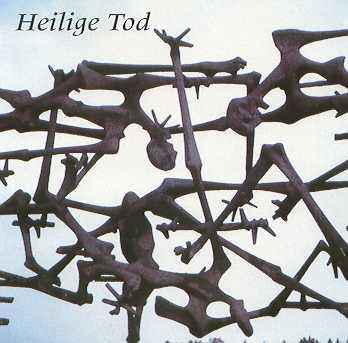
Aux
Morts
Vague
à l'Âme
Résurgence